by Celeste Lipford and Terry Lipford - last updated on 5/17/2025
While our Viking Cruise ship was docked in Avignon, Viking organized an afternoon tour to the Châteauneuf-du-Pape wine region, known in France as one of the appellation d'origine contrôlée (AOC) regions. Here, in one of the hottest wine regions in France, you get wines with wonderfully warm and spicy aromas such as cinnamon, cloves, and freshly roasted coffee.
The name "Châteauneuf-du-Pape" means "the pope's new castle" but the name does not allude to the papal palace. The town was probably already called Châteauneuf when the popes arrived. In 1893 the villagers, realizing the marketing potential of the name, added "du-Pape". Only one tower remains intact of the summer palace. Time, religious wars, and finally a German bomb during World War II have seen to that. But it is still quite impressive as is the stunning view over the vineyards and the river Rhône.

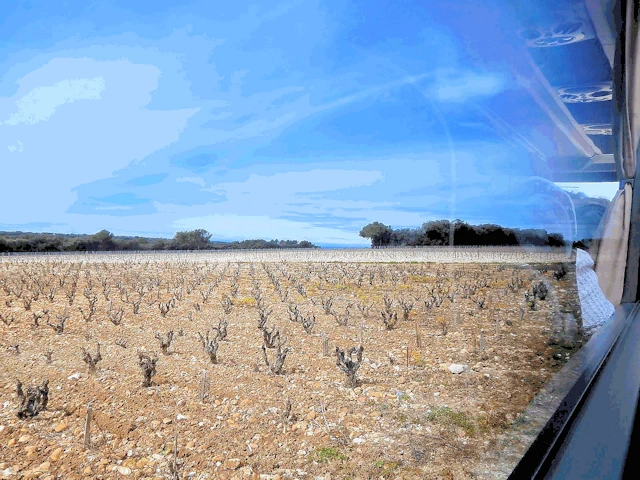 Vineyard Waiting For Warmer Weather
Vineyard Waiting For Warmer Weather The vines are pruned for removal of the unwanted wood. For those of you who do not understand why the vines are pruned, we suggest that you visit Pruning Grapevines for a good explanation of why it is necessary. (hint: 70 to 90 percent of the previous year’s growth is removed each winter.)
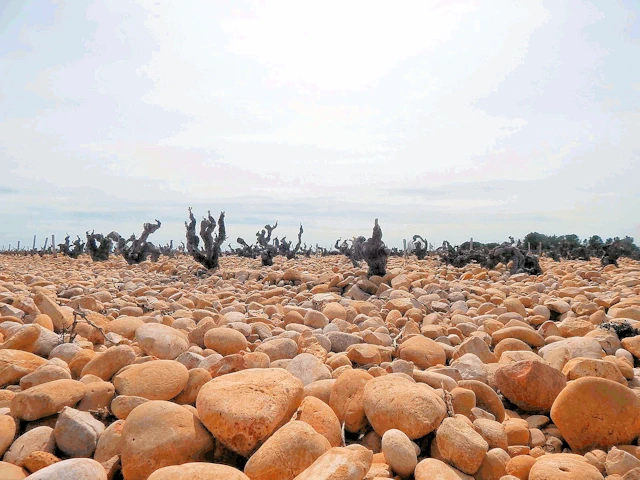 Rocks in the Vineyard
Rocks in the Vineyard The only purpose for those rocks is to keep the heat in the ground! The stones attract heat during the day, and the soil is therefore kept warmer at night.
Click here to read a good article on the Wine Enthusiast site, which will explain in more detail about these rocks.
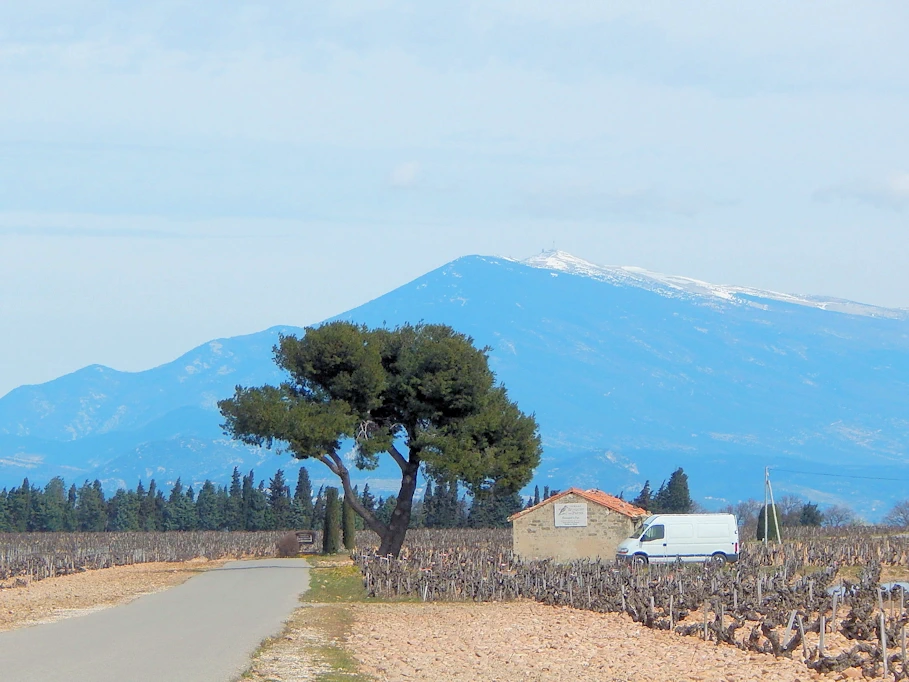 Montmirail Mountains
Montmirail Mountains Those are the (in the Dentelles de Montmirail mountains) and Mont Ventoux (just to the east of the Dentelles de Montmirail), as we looked east from the vineyard.
As can be seen in the above images, the vineyards are distinctively rocky, and these rocks are useful to the vines because they keep the daytime heat "in" the soil for a longer period of time, which keeps the roots warm overnight. This entire area has a unique clay sub-structure, and the combination of the heat retaining rocks, on top of this clay structure, produces a unique variety of grapes.
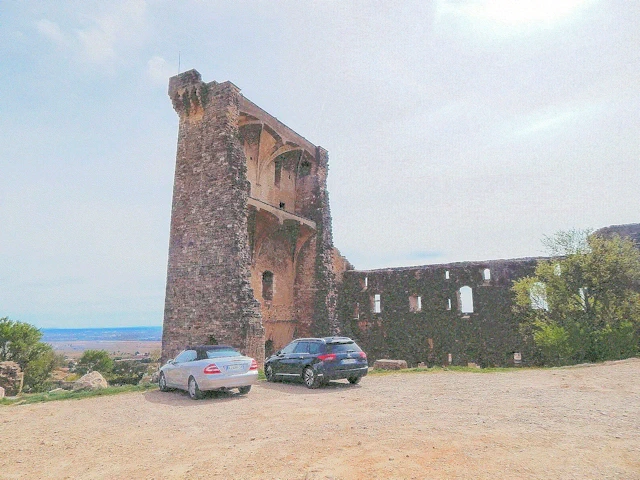 Castle of Châteauneuf-du-Pape
Castle of Châteauneuf-du-Pape In 1317, one year after his election, Pope John XXII ordered the construction of a castle at the top of the hill above the village of Châteauneuf-du-Pape. The castle was destroyed by the German Army, as it retreated from this area in August 1944.
Click here to read a good Wiki Article about this castle.
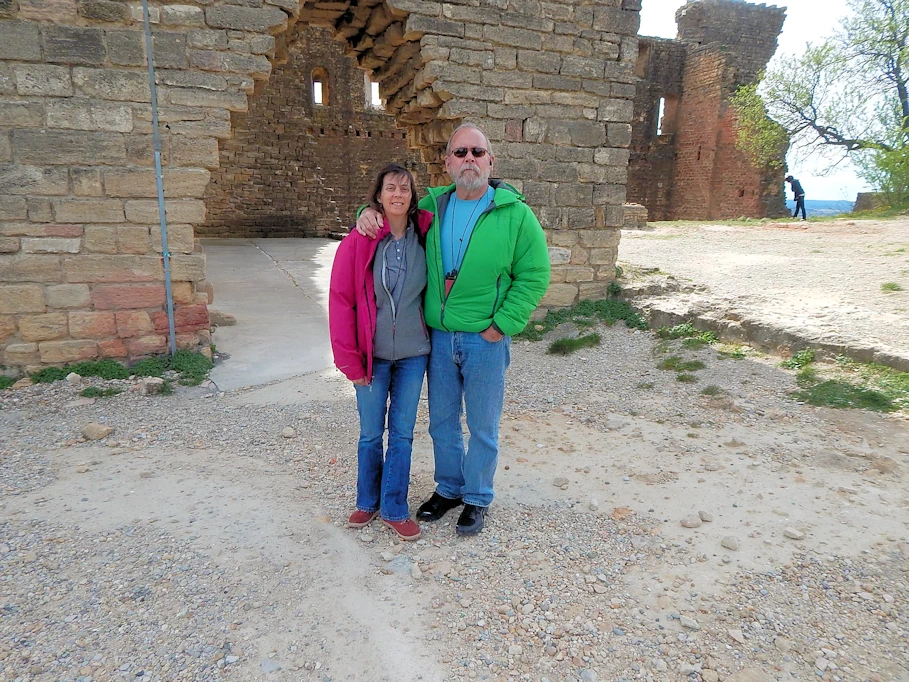 Châteauneuf-du-Pape Ruins
Châteauneuf-du-Pape Ruins Celeste and I posing just in front of the Castle ruins. This castle has been built, partially destroyed, and rebuilt a number of times since the Roman era. The final destruction occured during WW2 when the German Army garrison blew up the building because they were storing ammunition there.
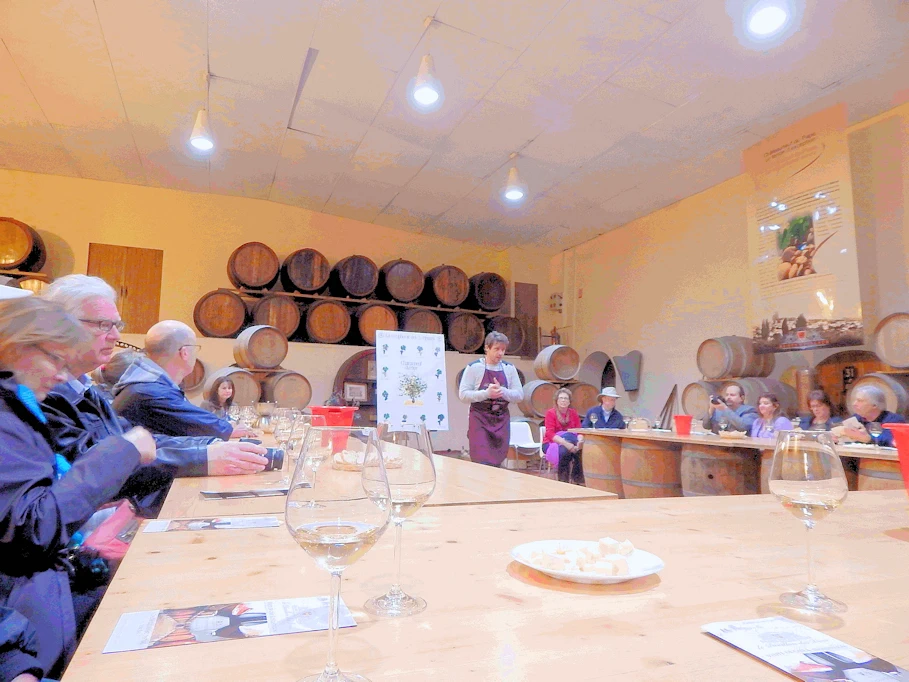 Wine Tasting Class
Wine Tasting Class Celeste and I are learning about the famous wines grown in this area. Touristy? Yeah, but the guy knew his wines, and the area's history, so in the end it was well worth the experience.
When you become aware that there are over 320 wine companies in this region, you realize how important these vineyards are to this region of France.
Did I mention the types of wine grapes grown in this area? We had been told at the wine tasting, but when I Googled it, I was amazed at how many types are grown in this region. I've provided you with a link to the "Wine Searcher" website for each wine, because if you are interested in wine like I am, you will want to know more about these types. Whenever "Wine Searcher" did not have information on a type, I've linked it to Wiki or "Wine Folly". Click any grape name below to be taken to a page that will provide you with an in depth description.
After our tour of the vinyards, we were taken to this winery, where they gave us an interesting short course on how to taste wine, the gentleman teaching us is a partner in this winery.
Anyone can taste wine - the Wine Folly website tells us, all you need is a glass of wine and your brain and follow these 4 steps;
1) Look: A visual inspection of the wine under neutral lighting
2) Smell: Identify aromas through orthonasal olfaction (e.g. breathing through your nose)
3) Taste: Assess both the taste structure (sour, bitter, sweet) and flavors derived from retronasal olfaction (e.g. breathing with the back of your nose)
4) Think/Conclude: Develop a complete profile of a wine that can be stored in your long term memory.
Or if you are a "Wine Spectator" fan, then click here to read their take on how to taste wine (hint - they are similar to 'Wine Folly')
The following list contains links to all of our other French Destinations & Information Pages, click any link to go to that page.
Note: All images featured on this page are the exclusive property of Just Traveling Thru, LLC, unless otherwise stated. When images from external sources are used, full credit is given to the original creator, along with a link to the specified license or usage terms. We are committed to respecting copyright and intellectual property rights, ensuring that all third-party images are properly attributed. If you have any questions regarding image ownership or usage rights, please feel free to contact us.
To review any of our content, make suggestions and/or comments, please click the "About" menu link at the top of this page. You will find our "Contact Us" link on that drop-down menu.